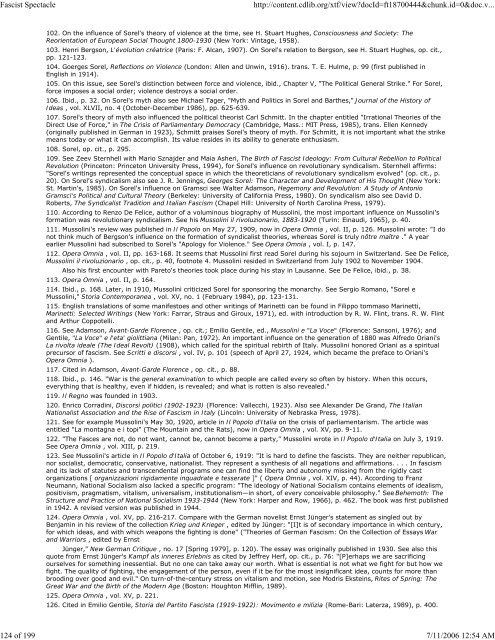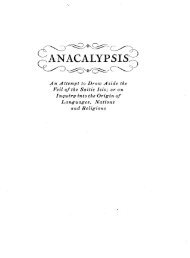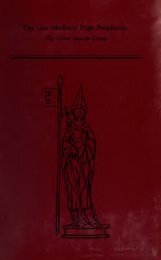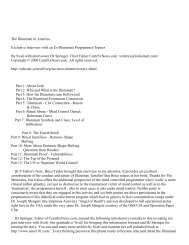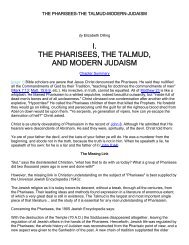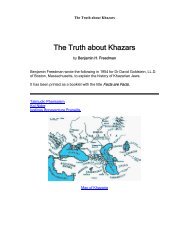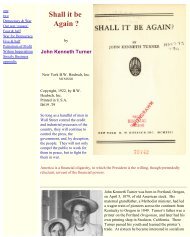Create successful ePaper yourself
Turn your PDF publications into a flip-book with our unique Google optimized e-Paper software.
<strong>Fascist</strong> <strong>Spectacle</strong> http://content.cdlib.org/xtf/view?docId=ft18700444&chunk.id=0&doc.v...<br />
102. On the influence of Sorel's theory of violence at the time, see H. Stuart Hughes, Consciousness and Society: The<br />
Reorientation of European Social Thought 1800-1930 (New York: Vintage, 1958).<br />
103. Henri Bergson, L'évolution créatrice (Paris: F. Alcan, 1907). On Sorel's relation to Bergson, see H. Stuart Hughes, op. cit.,<br />
pp. 121-123.<br />
104. Goerges Sorel, Reflections on Violence (London: Allen and Unwin, 1916). trans. T. E. Hulme, p. 99 (first published in<br />
English in 1914).<br />
105. On this issue, see Sorel's distinction between force and violence, ibid., Chapter V, "The Political General Strike." For Sorel,<br />
force imposes a social order; violence destroys a social order.<br />
106. Ibid., p. 32. On Sorel's myth also see Michael Tager, "Myth and Politics in Sorel and Barthes," Journal of the History of<br />
Ideas , vol. XLVII, no. 4 (October-December 1986), pp. 625-639.<br />
107. Sorel's theory of myth also influenced the political theorist Carl Schmitt. In the chapter entitled "Irrational Theories of the<br />
Direct Use of Force," in The Crisis of Parliamentary Democracy (Cambridge, Mass.: MIT Press, 1985), trans. Ellen Kennedy<br />
(originally published in German in 1923), Schmitt praises Sorel's theory of myth. For Schmitt, it is not important what the strike<br />
means today or what it can accomplish. Its value resides in its ability to generate enthusiasm.<br />
108. Sorel, op. cit., p. 295.<br />
109. See Zeev Sternhell with Mario Sznajder and Maia Asheri, The Birth of <strong>Fascist</strong> Ideology: From Cultural Rebellion to Political<br />
Revolution (Princeton: Princeton University Press, 1994), for Sorel's influence on revolutionary syndicalism. Sternhell affirms:<br />
"Sorel's writings represented the conceptual space in which the theoreticians of revolutionary syndicalism evolved" (op. cit., p.<br />
20). On Sorel's syndicalism also see J. R. Jennings, Georges Sorel: The Character and Development of His Thought (New York:<br />
St. Martin's, 1985). On Sorel's influence on Gramsci see Walter Adamson, Hegemony and Revolution: A Study of Antonio<br />
Gramsci's Political and Cultural Theory (Berkeley: University of California Press, 1980). On syndicalism also see David D.<br />
Roberts, The Syndicalist Tradition and Italian Fascism (Chapel Hill: University of North Carolina Press, 1979).<br />
110. According to Renzo De Felice, author of a voluminous biography of Mussolini, the most important influence on Mussolini's<br />
formation was revolutionary syndicalism. See his Mussolini il rivoluzionario, 1883-1920 (Turin: Einaudi, 1965), p. 40.<br />
111. Mussolini's review was published in Il Popolo on May 27, 1909, now in Opera Omnia , vol. II, p. 126. Mussolini wrote: "I do<br />
not think much of Bergson's influence on the formation of syndicalist theories, whereas Sorel is truly nôtre maître ." A year<br />
earlier Mussolini had subscribed to Sorel's "Apology for Violence." See Opera Omnia , vol. I, p. 147.<br />
112. Opera Omnia , vol. II, pp. 163-168. It seems that Mussolini first read Sorel during his sojourn in Switzerland. See De Felice,<br />
Mussolini il rivoluzionario , op. cit., p. 40, footnote 4. Mussolini resided in Switzerland from July 1902 to November 1904.<br />
Also his first encounter with Pareto's theories took place during his stay in Lausanne. See De Felice, ibid., p. 38.<br />
113. Opera Omnia , vol. II, p. 164.<br />
114. Ibid., p. 168. Later, in 1910, Mussolini criticized Sorel for sponsoring the monarchy. See Sergio Romano, "Sorel e<br />
Mussolini," Storia Contemporanea , vol. XV, no. 1 (February 1984), pp. 123-131.<br />
115. English translations of some manifestoes and other writings of Marinetti can be found in Filippo tommaso Marinetti,<br />
Marinetti: Selected Writings (New York: Farrar, Straus and Giroux, 1971), ed. with introduction by R. W. Flint, trans. R. W. Flint<br />
and Arthur Coppotelli.<br />
116. See Adamson, Avant-Garde Florence , op. cit.; Emilio Gentile, ed., Mussolini e "La Voce" (Florence: Sansoni, 1976); and<br />
Gentile, "La Voce" e l'eta' giolittiana (Milan: Pan, 1972). An important influence on the generation of 1880 was Alfredo Oriani's<br />
La rivolta ideale (The Ideal Revolt) (1908), which called for the spiritual rebirth of Italy. Mussolini honored Oriani as a spiritual<br />
precursor of fascism. See Scritti e discorsi , vol. IV, p. 101 (speech of April 27, 1924, which became the preface to Oriani's<br />
Opera Omnia ).<br />
117. Cited in Adamson, Avant-Garde Florence , op. cit., p. 88.<br />
118. Ibid., p. 146. "War is the general examination to which people are called every so often by history. When this occurs,<br />
everything that is healthy, even if hidden, is revealed; and what is rotten is also revealed."<br />
119. Il Regno was founded in 1903.<br />
120. Enrico Corradini, Discorsi politici (1902-1923) (Florence: Vallecchi, 1923). Also see Alexander De Grand, The Italian<br />
Nationalist Association and the Rise of Fascism in Italy (Lincoln: University of Nebraska Press, 1978).<br />
121. See for example Mussolini's May 30, 1920, article in Il Popolo d'Italia on the crisis of parliamentarism. The article was<br />
entitled "La montagna e i topi" (The Mountain and the Rats), now in Opera Omnia , vol. XV, pp. 9-11.<br />
122. "The Fasces are not, do not want, cannot be, cannot become a party," Mussolini wrote in Il Popolo d'Italia on July 3, 1919.<br />
See Opera Omnia , vol. XIII, p. 219.<br />
123. See Mussolini's article in Il Popolo d'Italia of October 6, 1919: "It is hard to define the fascists. They are neither republican,<br />
nor socialist, democratic, conservative, nationalist. They represent a synthesis of all negations and affirmations. . . . In fascism<br />
and its lack of statutes and transcendental programs one can find the liberty and autonomy missing from the rigidly cast<br />
organizations [ organizzazioni rigidamente inquadrate e tesserate ]" ( Opera Omnia , vol. XIV, p. 44). According to Franz<br />
Neumann, National Socialism also lacked a specific program: "The ideology of National Socialism contains elements of idealism,<br />
positivism, pragmatism, vitalism, universalism, institutionalism—in short, of every conceivable philosophy." See Behemoth: The<br />
Structure and Practice of National Socialism 1933-1944 (New York: Harper and Row, 1966), p. 462. The book was first published<br />
in 1942. A revised version was published in 1944.<br />
124. Opera Omnia , vol. XV, pp. 216-217. Compare with the German novelist Ernst Jünger's statement as singled out by<br />
Benjamin in his review of the collection Krieg und Krieger , edited by Jünger: "[I]t is of secondary importance in which century,<br />
for which ideas, and with which weapons the fighting is done" ("Theories of German Fascism: On the Collection of Essays War<br />
and Warriors , edited by Ernst<br />
Jünger," New German Critique , no. 17 [Spring 1979], p. 120). The essay was originally published in 1930. See also this<br />
quote from Ernst Jünger's Kampf als inneres Erlebnis as cited by Jeffrey Herf, op. cit., p. 76: "[P]erhaps we are sacrificing<br />
ourselves for something inessential. But no one can take away our worth. What is essential is not what we fight for but how we<br />
fight. The quality of fighting, the engagement of the person, even if it be for the most insignificant idea, counts for more than<br />
brooding over good and evil." On turn-of-the-century stress on vitalism and motion, see Modris Eksteins, Rites of Spring: The<br />
Great War and the Birth of the Modern Age (Boston: Houghton Mifflin, 1989).<br />
125. Opera Omnia , vol. XV, p. 221.<br />
126. Cited in Emilio Gentile, Storia del Partito <strong>Fascist</strong>a (1919-1922): Movimento e milizia (Rome-Bari: Laterza, 1989), p. 400.<br />
124 of 199 7/11/2006 12:54 AM


